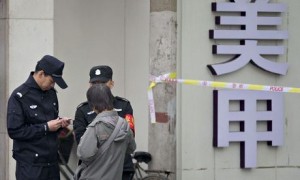Chinese authorities have rejected an appeal by imprisoned rights advocate Xu Zhiyong, as a publisher released his autobiography – and his beleaguered civic group, the New Citizens Movement, launched a website – in a concerted gesture of defiance.
Xu, 41, was sentenced in January to four years in prison for “gathering a crowd to disturb public order”. The charge stems from a series of small protests he organised in 2012 and 2013 to champion rural children’s education rights and official transparency.
The appeal took place in a Beijing court under intense security. Police blocked off pavements around the court, asked reporters to leave and manhandled a British diplomat, grabbing and shoving her.
A Foreign Office spokesperson said: “We continue to support the EU high representative Baroness Ashton in calling for the release of Xu Zhiyong and all those detained for the peaceful expression of their views.
“We are also disappointed that diplomats and journalists were obstructed and prevented from entering the courtroom and have lodged a formal complaint with the Chinese authorities.”
Human rights groups and US officials have also come down strongly against the court’s decision.
“Today’s ruling makes a mockery of justice as the decision was a foregone conclusion,” William Nee, China researcher at Amnesty International, said in a statement. “Instead of upholding freedom of expression and assembly, the court opted yet again to trample all over these fundamental rights.”
Nolan Barkhouse, spokesman for the US embassy in Beijing, said: “We call on Chinese authorities to release Xu and other political prisoners immediately, remove restrictions on their freedom of movement and guarantee them the protections and freedoms to which they are entitled under China’s international human rights commitments.”
Four group members were tried this week – Ding Jiaxi, Li Wei, Zhang Baocheng and Zhao Changqing – all on charges of “gathering a crowd to disturb public order”, which carries a maximum five-year sentence.
“We’re expecting that they’ll be convicted – I think the difference will only be a matter of sentencing,” said Maya Wang, a Hong Kong-based researcher at Human Rights Watch.
Wang said the trials had been marked by “procedural violations”. Authorities have intimidated witnesses, barred independent observers from the courtrooms and blocked the defensce from procuring evidence, he said. Ding and Li’s lawyers walked out of the courtroom in protest. Xu’s trial lasted only one day.
Xu, a former lecturer at the Beijing University of Posts and Telecommunications, rose to prominence by advocating for social justice from within the country’s fledgling legal framework. His ambitions often dovetailed with official priorities: Xu provided legal counsel to the victims of a tainted milk scandal and defended the education rights of rural children.
After pPresident Xi Jinping launched an ambitious anti-corruption drive in 2012, he broadened his focus to encompass official asset declaration. The New Citizens Movement – a loose-knit network of scholars, lawyers and lay people – held frequent dinner parties in cities throughout China to discuss reform. Last spring, some members, encouraged by Xi’s pro-transparency rhetoric, took to the streets to spread their message. Authorities retaliated with a protracted crackdown, detaining dozens of members.
Xu staunchly maintains his innocence. “This ridiculous judgment cannot hold back the tide of human progress,” he said in court during Friday’s proceedings, his lawyers told Reuters. “The haze of the communist dictatorship must eventually lift and the light of freedom, fairness, justice and love will eventually fill China.”
Xu’s autobiography, a three-part volume called To be a Citizen, was published by the Hong Kong-based New Century Press on Friday to coincide with the court’s decision. The book describes Xu’s experiences as an activist and lays out his vision of a democratic China.
The New Citizen’s Movement also launched a website, which internet censors promptly blocked. “It is the judges and decision-makers who have insulted the law,” said a statement on the site. “Now they have judged citizens, but history will judge them.”

